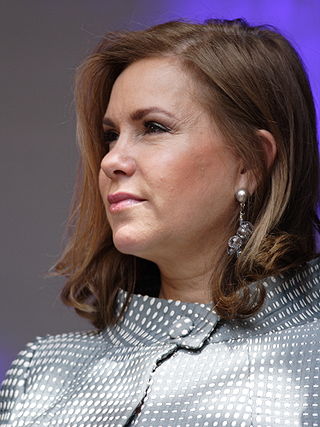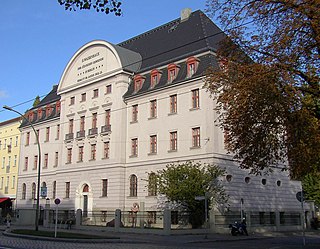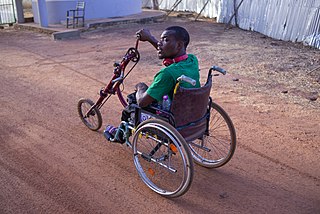
Disability is the experience of any condition that makes it more difficult for a person to do certain activities or have equitable access within a given society. Disabilities may be cognitive, developmental, intellectual, mental, physical, sensory, or a combination of multiple factors. Disabilities can be present from birth or can be acquired during a person's lifetime. Historically, disabilities have only been recognized based on a narrow set of criteria—however, disabilities are not binary and can be present in unique characteristics depending on the individual. A disability may be readily visible, or invisible in nature.

The Paralympic Games or Paralympics, also known as the Games of the Paralympiad, is a periodic series of international multisport events involving athletes with a range of disabilities. There are Winter and Summer Paralympic Games, which since the 1988 Summer Olympics in Seoul, South Korea, are held almost immediately following the respective Olympic Games. All Paralympic Games are governed by the International Paralympic Committee (IPC).

Maria Teresa is the Grand Duchess of Luxembourg as the wife of Grand Duke Henri, who acceded to the throne in 2000.

The Senang Hati Foundation, also known as Yayasan Senang Hati, is a non-profit organization in Bali that assists people living with disabilities. The name Senang Hati loosely translates as "Happy Hearts" in Indonesian. The foundation creates programmes to develop self-confidence, physical and economic independence, and increase awareness in the general community of the rights of people with disabilities. Senang Hati accomplishes this through the assistance of volunteers, who provide skills training and social interaction. The society also provides wheelchairs and housing, and runs Senang Hati Places, a home for disabled children.

Andreea Violeta Marin is a Romanian television presenter and TV personality.
Disability abuse is when a person with a disability is abused physically, financially, sexually and/or psychologically due to the person having a disability. This type of abuse has also been considered a hate crime. The abuse is not limited to those who are visibly disabled or physically deformed, but also includes those with learning, intellectual and developmental disabilities or mental illnesses.
The physically integrated dance movement is part of the disability culture movement, which recognizes and celebrates the first-person experience of disability, not as a medical model construct but as a social phenomenon, through artistic, literary, and other creative means.
The virgin cleansing myth is the belief that having sex with a virgin girl cures a man of HIV/AIDS or other sexually transmitted diseases.

Deinstitutionalisation is the process of reforming child care systems and closing down orphanages and children's institutions, finding new placements for children currently resident and setting up replacement services to support vulnerable families in non-institutional ways. It became common place in many developed countries in the post war period. It has been taking place in Eastern Europe since the fall of communism and is now encouraged by the EU for new entrants. It is also starting to take hold in Africa and Asia although often at individual institutions rather than statewide. New systems generally cost less than those they replace as many more children are kept within their own family. Although these goals have been made internationally, they are actively being working towards as reform and new reforms are put into practice slowly as is fit for each country.
Amin Maktab, established in 1961, is a special education center for mentally disabled children located in Gulberg, Lahore, Punjab, Pakistan. Amin Maktab is the oldest institution in Lahore for intellectually disabled children.

Disability in Ghana has a massive amount of stigma; children or people who are born disabled or deformed are assumed to be possessed by evil spirits.
Many disabled people face poor provision of facilities, and disabled children are commonly institutionalized, even though Russia is a party to the United Nations Convention on the Rights of Persons with Disabilities, having signed the treaty on 24 September 2008, and ratified it four years later, on 25 September 2012.
Peruvians with disabilities constitute 5.2% of the population. 52.1% of disabled people are women. 40.5% of disabled Peruvians have a primary or better education. 76.8% are not economically active they have an unemployment rate of 12.1%. Of those Peruvians with disabilities who do work, 58.3% are self-employed.

Disability in Yemen has been increasing over time, especially because of increased conflict in the area. Disabled people in Yemen face many challenges due to poverty, lack of accessible infrastructure, gender segregation and more. The government of Yemen has passed laws to help protect the rights of disabled people in their country, but not all laws are equally enforced.
Disability affects many people in Zimbabwe in both rural and urban areas. In spite of services provided by the government, philanthropists and welfare agencies, people with disabilities and their families often face several barriers. Philanthropist, Jairos Jiri, started services for people with disability in Zimbabwe in the 1940s. He is regarded as the father or founder of disability work in Zimbabwe.

Singapore does not have a formal definition of disability, but has been making changes in regards to the visibility of people with disability and also with increasing accessibility of all areas of the country. Early in the country's history, human rights issues for people with disabilities took second place to the need to secure independence and building the economy. Singapore signed on to the Convention on the Rights of Persons with Disabilities (UNCRPD) in 2013 and coordinates the Enabling Masterplan with both government and non governmental organisations.
People with disabilities face 1.5 times more violence than people without disabilities. The perpetrators are often people known to the person with disabilities, such as their partners, family members, friends, or acquaintances. It is estimated that 15% of the world's population lives with disability and are more likely to be poor and socially excluded. Thus violence against people with disabilities has many dimensions.

Approximately 12 million French citizens are affected by disability. The history of disability activism in France dates back to the French Revolution when the national obligation to help disabled citizens was recognized, but it was "unclear whether or not such assistance should be public or private." Disabled civilians began to form the first associations to demand equal rights and integration in the workforce after the First World War. Between 1940 and 1945, 45,000 people with intellectual disabilities died from neglect in French psychiatric asylums. After the Second World War, parents of disabled children and charities created specialized institutions for disabled children for whom school was not accessible. In 2018, the French Government began to roll out a disability policy which aimed to increase the allowance for disabled adults to €900 per month, improve the digital accessibility of public services, and develop easy-to-read and understand language among other goals.

Individuals with disabilities are more susceptible to contracting COVID-19 and have higher mortality rates compared to those without disabilities. This is particularly true for people with intellectual and developmental disabilities, those residing in care facilities, and women with disabilities. Individuals with disabilities face heightened risks of mental health issues related to the pandemic, such as increased feelings of loneliness and isolation. They may also be more vulnerable to domestic violence and abuse during the pandemic. People with disabilities are more likely to experience unemployment as a result of the pandemic and may require changes to the types of accommodations they require for work. Children with disabilities experience complications in their educational programming. Remote learning poses a host of challenges for children with disabilities, including disruptions to physical and occupational therapies and access to assistive technologies.
In the State of Palestine, disability affects 2.1% of the population, as defined by census. About half of all disabled Palestinians have mobility impairments. Education of children with disabilities is problematic with low school attendance.










